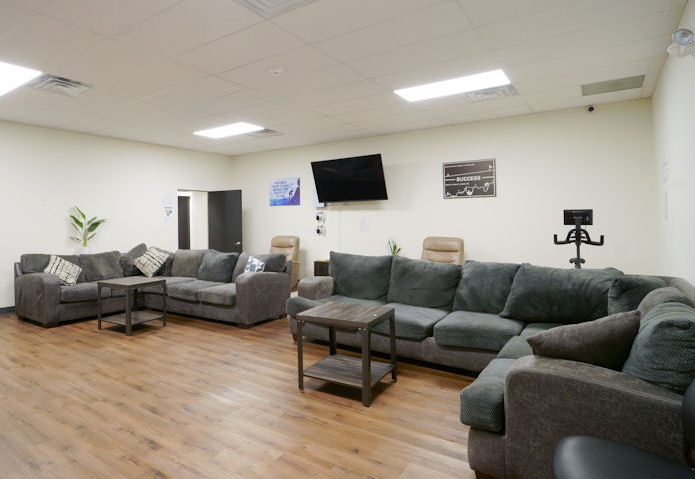Substance abuse is the use of illegal drugs or over-the-counter or prescription drugs or alcohol for purposes other than its original intent. Generally, when a person engages in substance abuse, the drug or substance is excessive. Substance abuse can lead to physical, social, and emotional job and personal related matters.
There has been an increased concern centered around substance abuse during the pandemic. In September 2020, about 15.1% of U.S. adults reported new or increased substance abuse due to pandemic-related stress.
Generally, for an individual struggling with a substance abuse disorder, mental health is affected. This is called a dual diagnosis or co-occurring disorder. Mental health illnesses can be chronic or acute.
When a person has a mental health illness, it is diagnosable and can affect a person’s psychological, social, and emotional well-being, and behavior. The conditions include:
- Mood personality disorders
- Schizophrenia
- Depression
- Anxiety
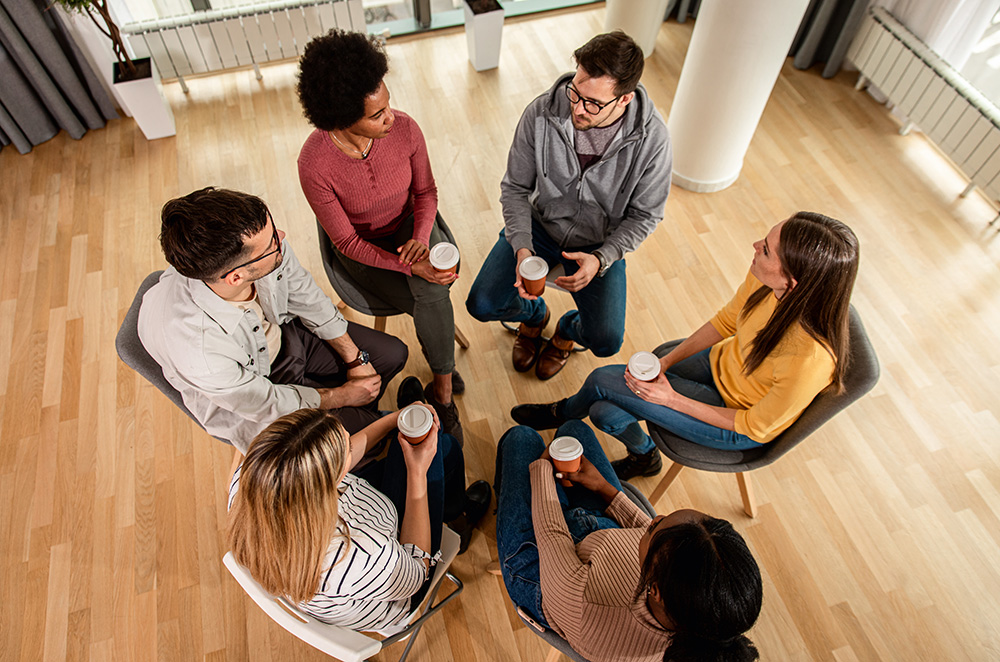
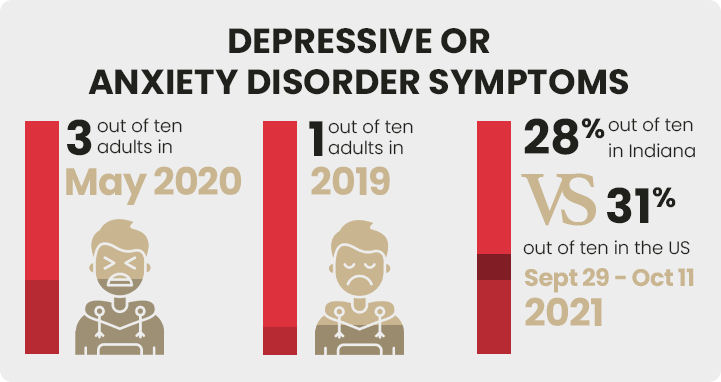
When it comes to Indiana, from September 29 to October 11, 2021, about 28.6% of adults reported depressive or anxiety disorder symptoms. Compared to 31.6% in the U.S.
What Is the Recovery Process?
- Improving health and wellness
- Living more self-sufficient lives
- Striving to reach full potential
Even individuals with chronic or severe substance use disorders can overcome their illness and regain social function and health with proper help. This step is called remission. Being in recovery is when positive values and changes become a part of a voluntarily adopted lifestyle.
While individuals believe that abstinence from all substance use is a fundamental feature of a recovery lifestyle, others think differently. Individuals report handling negative feelings without substance use; living a conducive lifestyle in recovery.
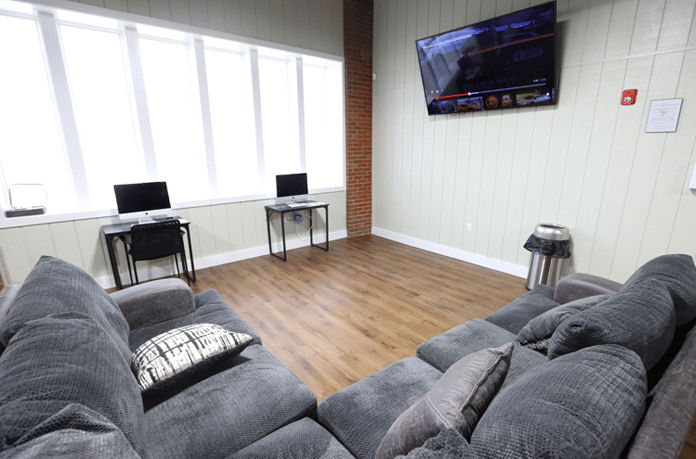
What Is Addiction?
Signs and Symptoms of an Addiction
- Increased spending on the substance, despite the financial concerns
- Withdrawal or social isolation due to substance
- Failed attempts to quit the substance
- A decline in personal hygiene
- Spending time recovering from substance abuse symptoms
- Intense cravings or urges for a substance
- Increased tolerance to a substance
- Increased risky behaviors
The stigmas that revolve around addiction undermine authentic struggles that individuals face daily. People will often rely on substances to act as a short-term coping mechanism. However, highly addictive substances can increase a person’s dependence.
Dependence on a substance or behavior typically leads to addiction. Technically, an individual can be dependent, but not yet addicted. The programs offered at our rehab center in Indiana will assist individuals in understanding how the brain is damaged by drug and alcohol use.
Once you understand the root cause of your addiction, it’ll be easier to comprehend what to do to get free from it. Despite the cravings that cloud a person’s judgment, drinking an excessive amount of alcohol or using prescription or illicit drugs won’t bring everlasting joy to your life.
Our Continuum of Care
Generally, the patients step down to less intensive levels of care as they begin their recovery process. In this specific model, our team will customize and adjust the care to meet the needs of the individual.
The continuum of care for substance abuse offers a wide range of addiction treatments. The goal is to meet the needs, no matter the current stage.
An effective behavioral, mental or physical health plan must include a streamlined and evident continuum of care to provide the best treatment possible.
The three main factors that determine whether someone will recover from substance abuse and maintain recovery over an extended period are:
- Social and community support, such as organized support groups
- Engaging in long periods of professional care
- Stability and support from loved ones
If the care isn’t constant, starting from the beginning of treatment, there are several places where the patient can discontinue care and fall out of recovery. As a result of that, the cycle can start all over again.
Why Is It Important to Follow Our Continuum of Care?
Our rehab center in Indiana can assist you in making more positive changes in your life and avoiding alcohol and addictive drugs altogether in the future. By showing a patient how to identify triggers that might lead them back into past habits, the continuum of care can show:
- New ways to cope with trouble and stress in personal relationships
- It can bridge the gap between the detox and recovery process
- It provides aftercare programs like sober living
Many individuals are involved in assisting patients in returning to a productive and healthy life after they engage in addiction treatment. Patients in active recovery often do the hardest work of all. Without the proper support throughout the journey, the possibility of relapse becomes greater.
Transitioning out of treatment is a difficult time, and when another service isn’t in place, the individual’s recovery is at a greater risk. Studies have shown that about 20% of individuals who transition without continuing the care will avoid relapsing after a year. When continuing care occurs, it increases the abstinence rate by 50%.
For example, a person might attend medical detox during the inpatient hospitalization and then wait weeks or months before attending a rehab center in Indiana. The individual might not get referred to a program at all. A lot can transpire in the weeks or months afterward that can cause several addiction matters landing the patient in the hospital, jail, or worse.
Our Rehab in Indiana Provides an Exceptional Continuum of Care
![]()
Alcohol Addiction
![]()
Cocaine Addiction
![]()
Fentanyl Addiction
![]()
Heroin Addiction
![]()
Meth Addiction
![]()
Opioid Addiction
![]()
Prescription Drug Abuse
![]()
Tramadol Addiction
![]()
Xanax Addiction
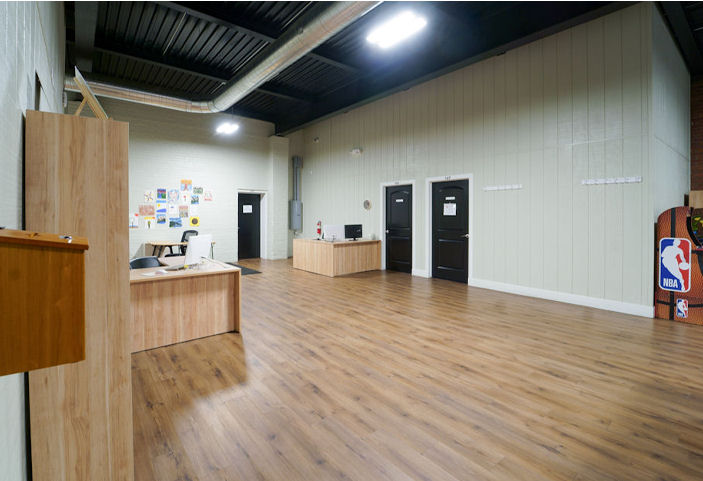
Programs at Our Rehab Center in Indiana
Medical detoxification, also known as detox, is a vital step in the recovery process. This step becomes necessary when the withdrawal symptoms from drugs or alcohol are severe. Medical detox is for patients who have shown physical or psychological dependence on drugs or alcohol.
The detox can assist in securing a healthier future by helping clients reduce cravings and alleviate withdrawal symptoms. It helps by dealing with the physical side of addiction so the patient can face the psychological factors. Medical interventions during detox ensure the client is safe and comfortable undergoing withdrawal symptoms.
It’s the process of eliminating addictive and toxic substances from the body. It’s under the supervision of our medical professionals. The main objective of medical detox is to minimize the physical harm a client can face by quitting alcohol or drugs.
After an individual has completed detox, they immediately begin therapy to address life stressors and other factors that led to their addiction. One of the helpful approaches is cognitive-behavioral therapy, which assists in revealing a client’s thoughts and feelings that encourage their drug use.
Once the reasons behind addiction are understood, they become more equipped to overcome the issue. Another highly effective therapy method is contingency management. This option involves giving the patients incentives after attending all therapy sessions or passing the drug test.
Human beings love to pursue what brings a sense of reward, and that’s how addiction begins. Contingency management teaches clients how to experience healthy pleasures and rewards. The other therapy approaches offered are:
Individual Therapy
The client will meet with a trained professional to work through personal matters. In the sessions, the patient will feel safe discussing details that wouldn’t be comfortable to discuss in a group setting. During the sessions, it’s encouraged to talk about:
- Any problems experienced at work
- Concerns about family or friends
- Strained relationships
- Pain points
Group Therapy
It is encouraged that you’ll also attend therapy sessions with other individuals struggling with similar issues as yours. You’ll be able to develop techniques to handle challenging life situations and share experiences. This therapy highly benefits those struggling with depression and anxiety. Another benefit is being able to establish more meaningful relationships with others.
Family Therapy
Another vital component of the rehab process is family therapy. It brings the patient and family members together to identify family patterns contributing to drug abuse or mental illness. Your family members will be able to understand your condition and offer more support.
Kokomo is a beautiful city located in Howard, City, Indiana. We have a promising future and impressive background here. Our population is highly populated and over 58,000 individuals, according to the 2019 census.
The danger that lies with a large population is increased drug use and overdose. In 2019, per 100,000 individuals, there were 23.7 deaths. Our helpful program for those struggling with drug abuse is our inpatient rehab, also known as a residential treatment program.
This inpatient rehab is an intensive treatment program for individuals with severe substance use issues. Our clients move into a controlled environment where they become full-time residents. During this program, 24/7 care and support will assist them in overcoming their addiction.
The main aim of inpatient rehab in Indiana is to remove the patient from their trigger-filled environment and make them more fully involved in their treatment. The client can stay in our rehab facility for 30 to 90 days, or longer, based on the severity of their condition.
When individuals have co-occurring mental disorders, their stay will be longer. The rehab center might offer access to swimming pools, private rooms, the gym, spa, cafeteria-style meals, and luxury suites. Our two inpatient programs are residential inpatient and partial hospitalization. Additionally, we offer a mental health residential stabilization program for our clients dealing with strictly mental health issues.
Our outpatient program works to help establish and develop a commitment to recovery. It enables patients to continue with their independent livelihood throughout the treatment process. The outpatient program is beneficial for the following:
- Those who struggle with substance use disorders and are serious about sobriety
- Building a safe and supportive network for recovery
- Vary in flexibility and intensity depending on the patient
The patient can stay home and continue with their daily responsibilities. However, they will need to check in with our rehab center in Indiana at scheduled times for medication, counseling, or sessions. Our treatment strategies in the outpatient program are:
- Medication-assisted treatment
- Cognitive-behavioral therapy
- Family and group therapy
- Dual diagnosis treatment
- Motivational interviewing
An intensive outpatient program offers patients a flexible way to approach treatment. Patients can continue daily routines without any disruption while still undergoing treatment. A residential treatment program requires patients to live on-site in our monitored location.
In contrast, some patients do still live at home for an IOP and it facilitates new coping mechanisms and helps patients learn more skills to prevent relapse.
Our behavioral health professionals at our rehab facility recommend PHP as a suitable approach based on the initial assessment and consultation. It’s suited for an individual who has completed the medical detox program and doesn’t require 24-hour medical monitoring or safety measures. The elements of a PHP are cognitive-behavioral therapy and medical management.
Regardless of the reason, for those who either don’t or can’t go back home, sober living is the option for them. We provide sober living whether the individual wants treatment or not. Sober living homes are communities of residences designed for those who are newly out of treatment.
These communities are for individuals seeking a structured, safe, and substance-free environment. It’s a way to live as they get back on their feet and live a new and sober life.
Contact Us Today
You can contact us through phone or email.
Prior to admitting yourself into an addiction treatment center, you need to contact that treatment center directly.
When you first communicate with an addiction treatment center, they will ask you several questions about yourself and your struggles with addiction. When they’re asking you these questions, make sure that you are as honest as possible. This allows the treatment center to have a better idea of what programs to place you into.
At First City Recovery Center, we will do everything within our power to place you in the right treatment programs. As a result, we will be able to give you the highest chance of achieving long-term sobriety when you complete them.
